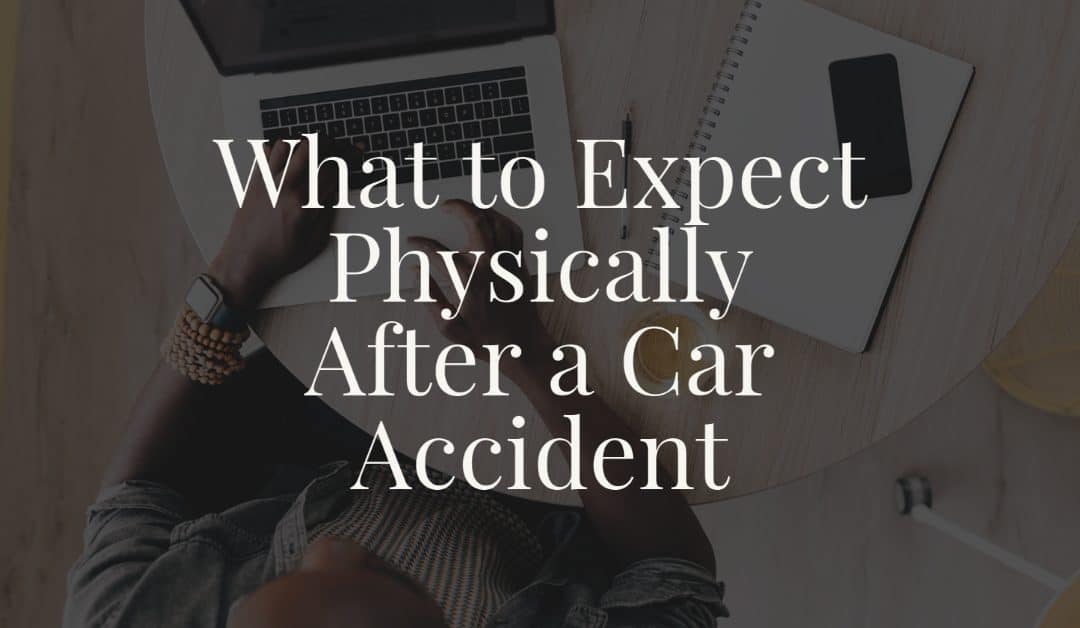If you’ve driven for a few years, you most likely have had a fender bender. However, if you are in a crash that throws you around a bit,you may think you’re fine when you’re not. If a car accident has you all shook up, there is a reason for that. Find out what to expect physically after a car accident.
Adrenaline
Because a car accident is by nature out of your control, your body produces large amounts of adrenaline hormone when you crash. Adrenaline helps you go into a survival mode called fight or flight. This survival mode kills pain in your body using adrenaline and other human hormone cocktails. The lack of pain and jolt of energy readies you for extreme situations. You can often walk away from the scene of a terrible accident thinking that you are just fine.
After an accident, you can easily feel wonderful and believe that all is well, even if you have bad injuries. The pain-killing nature of adrenaline gives you a natural high. This is why they call people who jump out of planes for fun “adrenaline junkies.”
Adrenaline is the reason that people in terrible situations sometimes have a superhuman strength to lift a car or cut off their own arm to get free of certain death. Adrenaline causes an all-natural high in us when we experience danger or terror.
During the natural high you experience, the masking of pain can cause a belief that you are not injured. However, you may find that you have muscle pain and fatigue or even muscle tears or internal damage you can’t feel now in the coming days and weeks. It is possible even to have a concussion and feel no pain immediately following an accident.
The Force of Impact
Because of the speeds involved in most accidents, there can be combined forces above 120mph at impact. Even if you were each going 30mph in a head-on collision, your combined speeds created 60mph worth of force against each vehicle.
Even with a seatbelt on, your neck could have been thrown forward and then back. Your body could have hit the dash or your head the window. The seatbelt could have cut into your internal organs with severe blows that you don‘t even feel until hours later, if at all. You could have internal bleeding and not even know it.
After the Accident, Watch Your Mouth
Never say that you are not injured after an accident. That statement can come back to cause you trouble in the future if you need reimbursement for your future doctor bills. Because North Carolina is an “at Fault’ state, even if you are only found 3% at fault for the accident, the other driver is not responsible for contributing to any of your compensation. If you share even 1% of the fault, the other driver pays nothing.
Never admit fault after an accident. Do not discuss fault or what happened with anyone except your attorney for the best outcomes. The police officer, the other participants in the wreck, and the bystanders are not on your side, but your attorney is.
Also, never say that you are not injured. Immediately following a wreck is not the time to decide if you are injured. The truth is that you do not know yet. Only time can tell if you have hidden injuries.
Pain May Come Later
According to Integrity Spine & Ortho, “In the days and weeks following a car collision, any aches, pains, twinges or abnormal feelings you experience should be taken seriously. At the first sign of any pain or symptoms, make an appointment to see a doctor and get checked out.
Unfortunately, many people brush off neck or back pain because they believe it’s a minor injury that will go away on its own. However, that’s not always the case. Even mild pain can indicate a serious injury that needs medical treatment.
- Neck pain could be a sign of whiplash, a herniated disc, a joint injury, or a pinched nerve
- Low back pain could be a sign of a herniated disc, a joint injury, a pinched nerve, or a compression fracture
- Headaches could be a sign of whiplash, soft tissue strain, or a concussion
Failing to get an evaluation and treatment as soon as possible could escalate an injury and prolong the healing time.” (1) Sometimes the days and weeks following an accident can feel like a blur, and you may even experience some depression. This is normal, but don’t let it stop you from making sure you get the treatment you need.
Find Answers
If you’ve been in a car accident and are struggling with personal injury, you need someone on your side. Contact us at Cape Fear Law to find your next steps forward. We are here for you no matter what happened or whose fault it was. You have the right to seek treatment for pain and compensation and damages from another driver for an accident in which you are not at fault.
Get in touch today and start moving your life forward.

